Tear gas was this week used against people in rural France protesting against the arrival of authoritarian president Emmanuel Macron.
As I witnessed for myself, the town of Ganges, in the Hérault department, was divided into two for the day in a military-style police occupation.
Combined with the state’s draconian use of “anti-terrorist” laws to ban the banging of saucepans, the overall impression is frankly alarming.
“We’re going straight there, into repression and dictatorship”, warned trade unionist Gérard, one of a thousand-strong crowd that turned out on Thursday April 20.
Macron’s visit to the local middle school, ironically named after anarchist revolutionary Louise Michel, was the second stop in a national tour in which he is supposed to be making peace with the French public after months of huge protests against his pension “reforms”, which he ended up forcing through parliament without a vote.
But, with hundreds of tooled-up gendarmes ensuring nobody but the invited few got anywhere near him, Macron’s visit to Ganges, like the previous day’s trip to Alsace, hardly spoke of a desire for dialogue.
“He listens more to Capital than to the people”, remarked Matthieu Guy, secretary-general of the CGT union in Ganges.
One protester, Gilbert, a Gilet Jaune, said the Macron regime was the worst he had seen in many decades of campaigning.
“It’s a kind of dictatorship which pretends to be in favour of human rights”.
Brutal policing methods initially deployed in poor urban areas had then been used against the Gilets Jaunes and now against the current protest movement, he remarked.
Gilbert said protest was increasingly criminalised, with people losing their eyes through being targeted by police grenades, receiving ridiculously heavy fines or spending years in prison on trumped-up charges.
He pointed to a recent case in the north of France, where a woman had been arrested in her own home for saying on Facebook that Macron was “une ordure” (lowlife). She is threatened with a 12-thousand euro fine.
Minister of the Interior Gérald Darmanin has even been using the term “intellectual terrorism” to smear opposition to the regime.
Gilbert said the contempt for democracy shown by Macron and his cronies had reached a point where trade unionists and others now found themselves in the same situation as the Gilets Jaunes, fighting a system which denied even their basic right to dissent.
“It’s a form of 21st century totalitarianism, based on surveillance and mass repression”.
All was quiet when I turned up in Ganges the night before Macron’s arrival, with the only obvious sign of the impending visit being the taped-off parking spaces near the Louise Michel school.
In the Café du Siècle, in the village centre, conversation seemed to be revolving more around a forthcoming Flamenco festival.
However, the man at the take-away pizza shop was far from happy at the prospect of Macron’s visit and was quite rude about the president’s character.
“And I thought he was someone who might get something done, when he first stood”, he added.
“How could you have thought that?” countered his friend. “He worked for the international bankers”.
While I sat on a bench enjoying my pizza, a young lad on a motorcycle pulled up in front of me.
“Excuse me!” he called. “Is it true that Macron’s coming here tomorrow?”
He seemed shocked when I confirmed the rumour of the visit. “Well, he’s not going to forget it in a hurry!” he called, as revved off into the dusk.
Glancing through the local paper, I saw that the president had originally intended to visit the town of Lunel, in the same department, but that, according to a member of his team, he had been put off the idea by a “fear of protests”.
Ganges was considered the soft option, then.
Police vans and personnel were already patrolling the streets of the little town before 7am on Thursday and protesters were gathering at the Café du Siècle for coffee and croissants.
Reports came in of motorists being stopped and searched on approach roads and when a minibus of CGT members turned up, singing and waving flags, they explained that the police had not allowed them to bring their saucepans with them.
It transpired that a decree had been issued by the Prefect of the Hérault department, banning anything that could make a noise, such as saucepans, under “anti-terrorism” laws!
At 7.10am six gendarmes turned up on the pavement opposite the café and began what was to prove to be an all-day presence.
I learned that police had been visible in Ganges all week, working out how to block all possible ways of reaching the school.
Sure enough, I found that not only were the roads leading in that direction sealed off, but even a tiny alleyway was fiercely guarded by half a dozen gendarmes.
By 7.45am there were already 30 or 40 protesters outside the town hall, more than two hours ahead of the advertised 10am meet-up.
At 9am, the atmosphere was really building up. A group of protesters had gathered in the road outside the Café du Siècle, accompanied by black balloons, a coffin representing the death of democracy and an accordionist.
Meanwhile, hundreds were now assembled over at the town hall.
At 9.25am there was a general move towards one of the side streets blocked by the police and at 10am protesters from another road reported the first tear gas of the day, following a bid to reach to the school.
To the sound of chants calling for the president to resign (“Macron démission!“), the song “On est là!” (once the hymn of the Gilets Jaunes and now that of an even broader resistance movement), the banging of dustbins and, yes, even terrorist-style saucepans, the protesters tried their best to go and meet the head of state.
But the cops, donning their riot gear, were not having it and the stand-off continued until 11am, when the focus switched to the road outside the café, another means of approaching the school.
Police strengthened their resources, fired off some more tear gas (not a pleasant experience) and by 12.30pm the main interest in the stalemate was the traditional French sport of throwing eggs at the police vans’ windscreens.
In all this time, of course, nobody had made even a distant sighting of Macron, who was safely protected from the public in the sealed-off militarised side of town.
At 1pm, a wildcat protest set off to the bypass to try to intercept the president on his way out of town.
This main road was left gridlocked for hours and it was not until 4pm that the riot police managed to force the last protesters from a roundabout.
The traffic chaos was just one of many reasons why Macron’s visit was not a big hit with the people of Ganges.
But then the event was not really about their town anyway, but simply part of Macron’s 100-day PR initiative aimed at dispelling the deep disquiet over the pension law and the undemocratic way it was imposed.
Matthieu of the Ganges CGT said the president clearly wanted to turn the page on the pensions issue.
But they were not going to let him get away with it, which is why they had organised a “welcome committee” for him.
“This reform is completely unjustified and unjust”, said Isabelle in the demo outside the town hall.
Fellow protester Guilaine stressed that people were still really angry. “It’s not the fact that he’s passed the law that’s going to stop us!”
Gérard explained that the reform was not even necessary, with workers already having to notch up 43 years of contributions in order to claim the full state pension.
The deficit of which the government complained was caused by its policy of letting big companies off paying pension contributions for their workers, in exchange for them taking on jobless people in official schemes.
Furthermore, he said, if women were paid the same wages as men, the additional contributions would plug the so-called “gap”.
Myriam, a delegate of the FSU civil servants’ union, told me that Macron’s presidential approach was not normal: “He doesn’t listen and there is no social dialogue”.
She said trade unions had presented an alternative plan to the president back in November and it would be entirely possible to fix the retirement age at 60, rather than 64.
“We need another vision of society, for the young and for the old”.
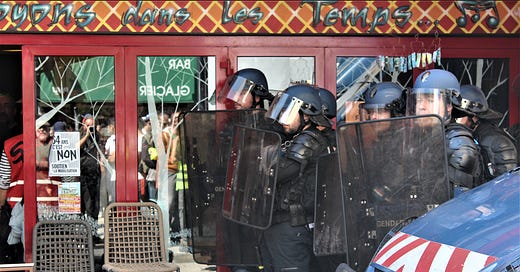



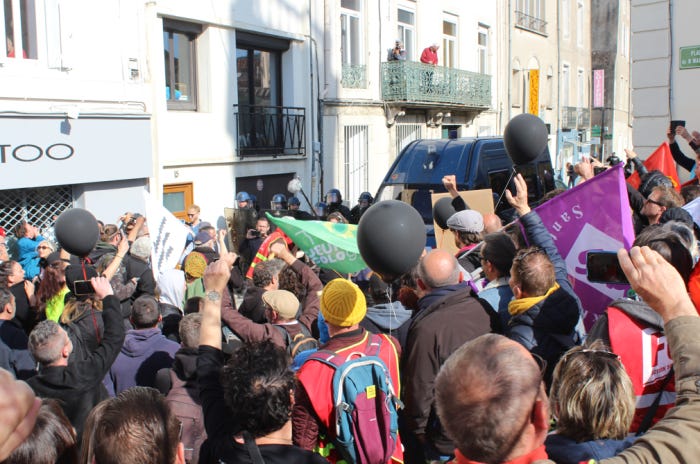
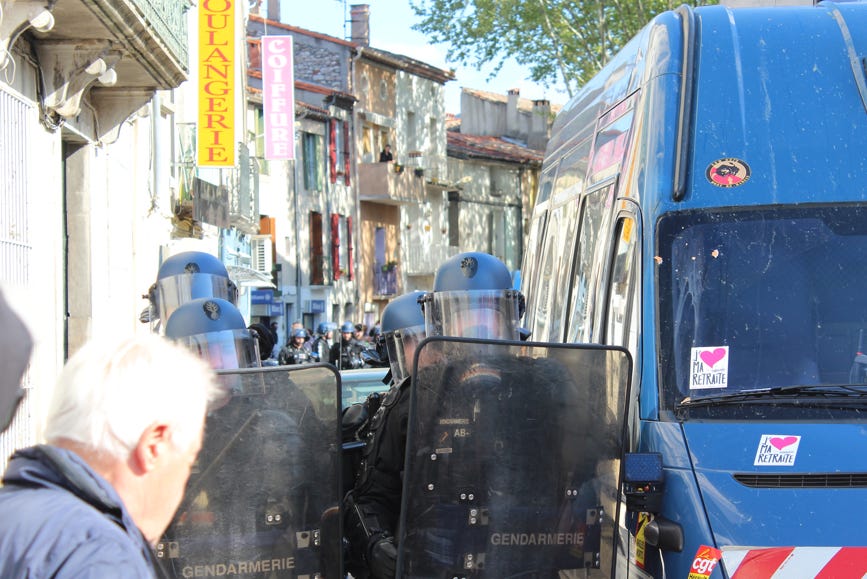
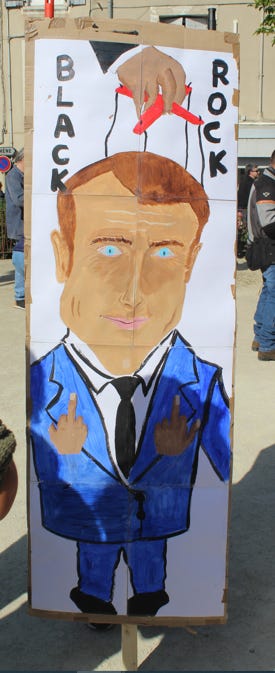
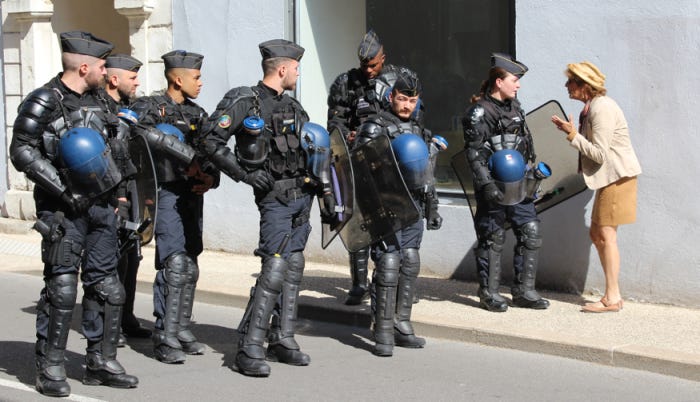
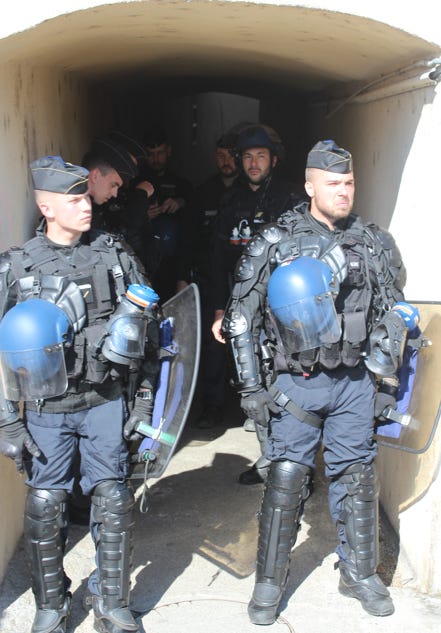
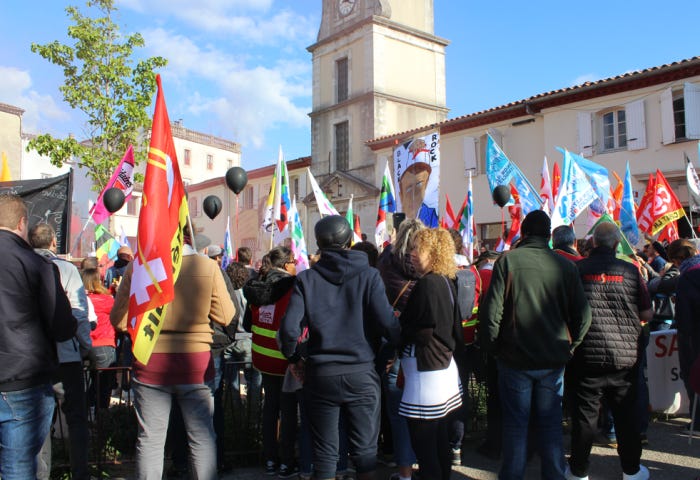
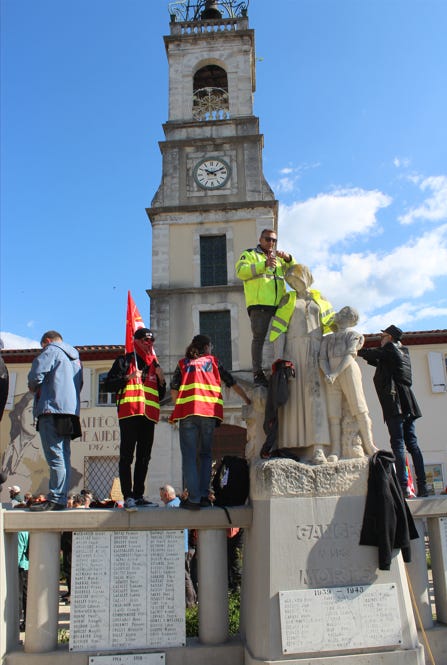
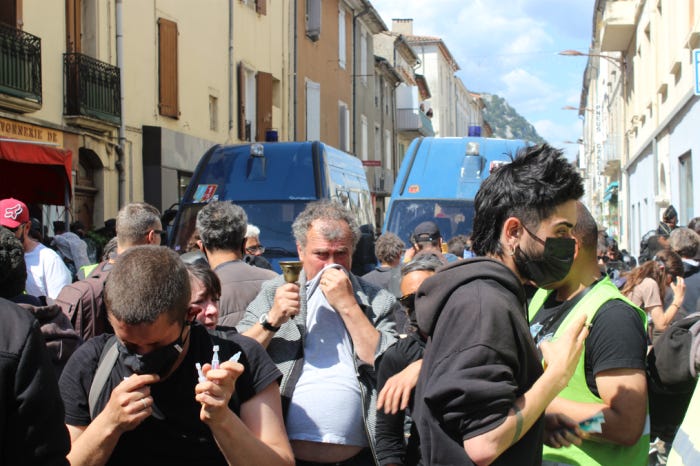
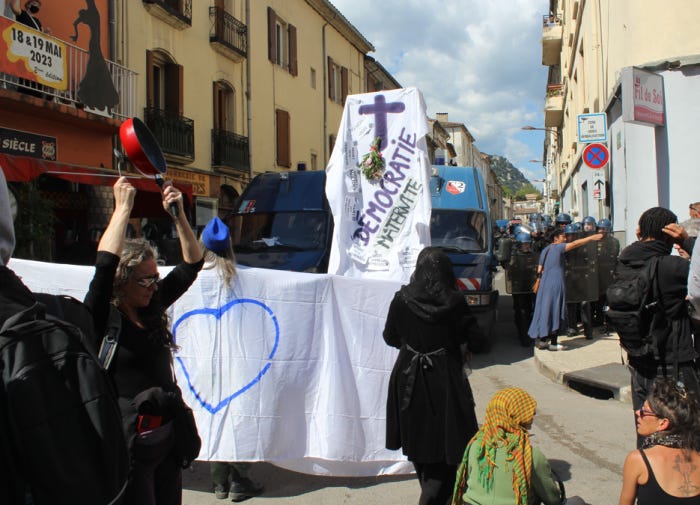
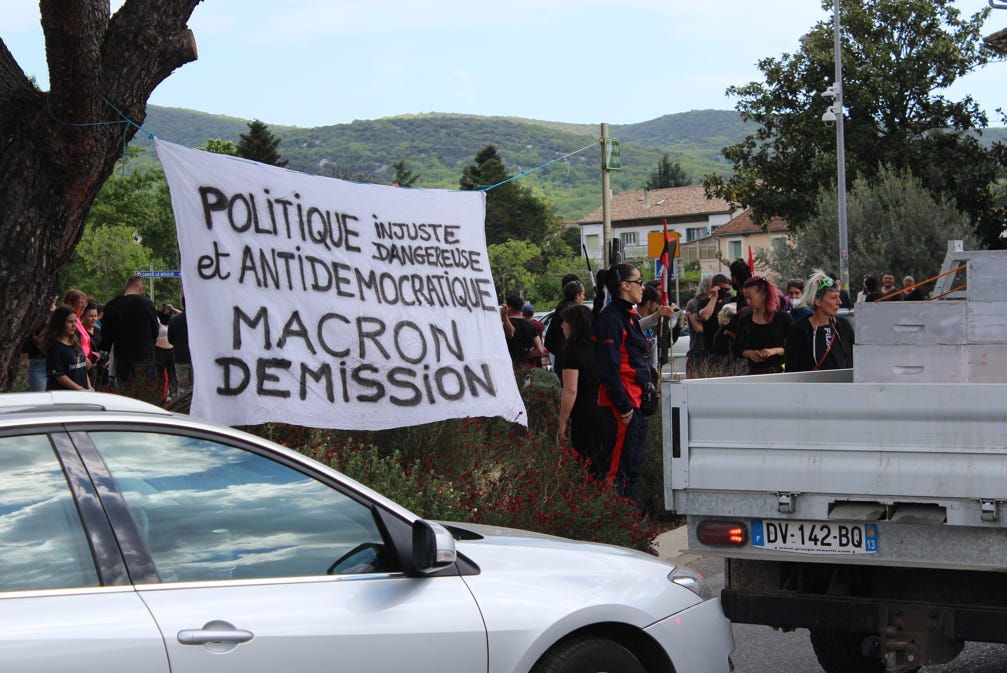

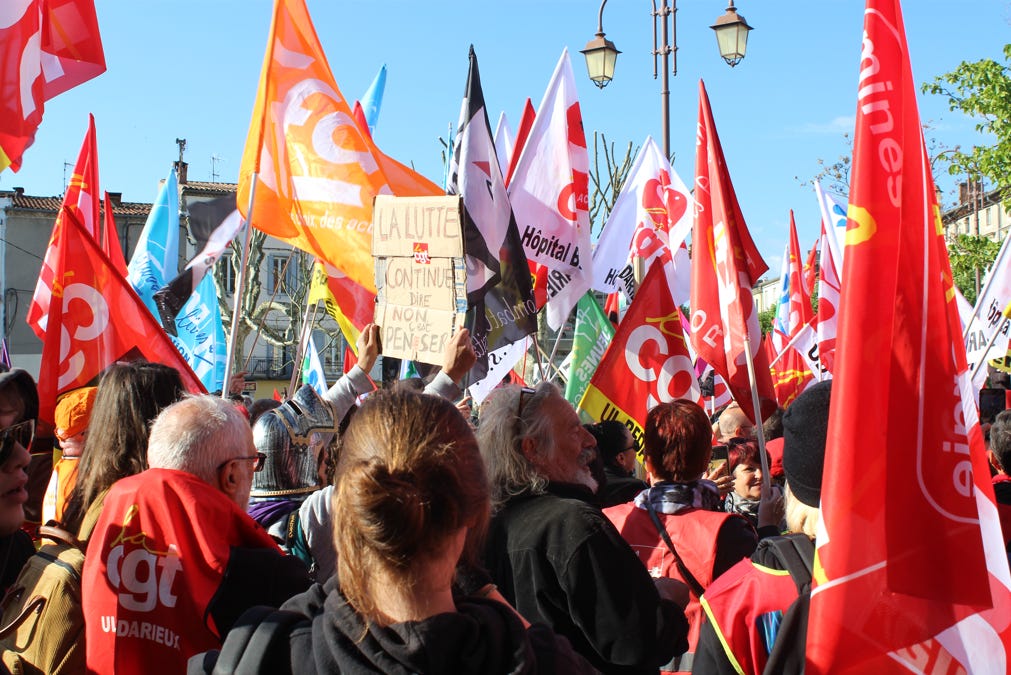

“Anti-terrorist” laws were enforced to ban the banging of saucepans."
Will banging on toy drums ensure a death sentence?
Macron barely won the last election he has "no" real mandate. The French were fooled like the Americans thinking a "middle-of-the-road" politician would be a safer bet... Little did they know, that he like Biden were installed by unelected ghoul banksters who are protected by a militarized security state who cut their teeth on the Yellow Vest Protesters. To put it simply, Macron exclusively reports to wealthy goblins and does what they demand and that's why he brazenly passed a punitive pension law without consent from parliament. The "real" government of France is a syndicate of transnationalist finance predators who specialize in "disaster gangsterism."
Fabulous, thanks. I was upset a few weeks ago by Meryl Nass, tireless health freedom activist who I admire, cross-posting on her Substack a tirade from someone claiming that the "black shirts" at the demonstrations in Paris causing the unruly and violent moments were in fact not really against Macron but were fifth columnists sent by the WEF to stir up chaos and turn the French people against the demos. I was too dismayed to write Meryl and say, "What are you doing!?" Unfortunately more than a few on this side of the health freedom divide have no clue about anarchism or real revolution, they've never heard of Abdullah Ocalan and his Kurdish democratic confederalism movement. Instead they mostly cherry-pick people like Fauci to fulminate against. Many of them keep defending the holy US Constitution while never mentioning the word "capitalism" which is behind the whole Covid scheme. I keep saying, "Bill Gates may be a monster but he's a capitalist success story!" But meanwhile they're won't consider what's happening now with WEF etc. as the latest iteration of the capitalist elite. Which includes, of course, Macron